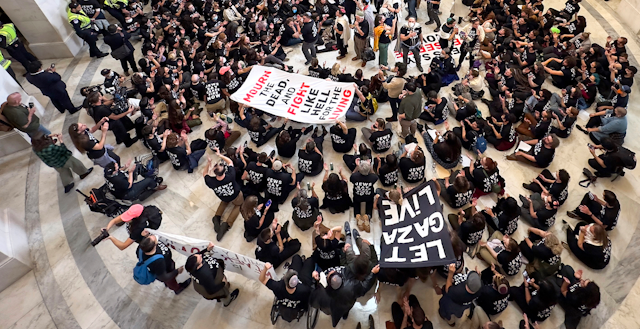Since Hamas launched its offensive in Israel on October 7 2023, drawing a swift and emphatic response from the Netanyahu government, at least 1,400 people in Israel and 5,000 people in Palestine have been killed. Many of these have been civilians – hundreds of Israelis at a music festival near the Re'im kibbutz, close to the border of Gaza. Hundreds of Palestinians were killed by an explosion at the Al-Ahli Baptist Hospital in Gaza.
While the first atrocity was committed by Hamas fighters, responsibility for the hospital blast has yet to be determined. Investigators will eventually attempt to piece together the truth about both atrocities. But will anyone stand trial for war crimes?
The International Criminal Court has the jurisdiction to investigate potential war crimes in Israel and Palestine. Palestine joined the court in 2015. In 2021, the then prosecutor, Fatou Bensouda, announced the opening of an investigation into crimes alleged to have been committed since June 13 2014 in the West Bank, Gaza Strip and East Jerusalem, the date when Palestine declared acceptance of ICC jurisdiction. Between then and early 2023, more than 3,000 people have been killed in Palestine, and more than 200 in Israel.
What the ICC can do
Give the current situation in Israel and Gaza, the ICC could take two measures. Tirana Hasan, the director of global rights campaigner Human Rights Watch, has written to Karim Khan, the ICC prosecutor, calling on the ICC to explicitly warn Hamas and Israel against committing crimes.
Bensouda did something similar in 2018 when she warned Israel not to forcefully evict a Palestinian community from Khan al-Ahmar, a village in the occupied West Bank. She said the eviction could constitute a war crime, as defined in article 8.2 of the ICC Treaty, which prohibits the deportation or transfer of all or parts of the population of the occupied territory. Combined with pressure from local and international communities, a warning of this kind could have a temporary effect, as it did in this case. But, in the event, even though diplomats from many states have tried to discourage the eviction, the Israeli government still wants to proceed.
Second – and more importantly – Khan told Reuters press agency on October 12 that the actions of both Hamas militants in Israel and Israeli forces in the Gaza Strip fall under the jurisdiction of the ICC, even though Israel is not a member state. “It’s horrendous what’s going on, what we’re seeing on our television screens. There has to be a legal process to determine criminal responsibility,” he added.
Challenges and investigations
There are three issues that could hinder an ICC investigation: a lack of cooperation by Israel, a lack of financial support from member states and pressure by countries which feel a solution would be easier to achieve without the involvement of the ICC and the prospect of war crimes charges being levelled. This pressure would be dangerous for the ICC’s credibility. It is important for justice and politics to remain independent.
The UN’s commission of inquiry, mandated by the UN Human Rights Council, has been collecting evidence of potential war crimes committed by all sides in Israel and Occupied Palestinian Territories since October 7.

It has already said that there is evidence that war crimes have been committed, both by Palestinian militants, gunning down civilians and taking hostages in Israel, and by Israel’s response by putting Gaza in a state of siege, which it has described as appearing to be “collective punishment”.
Human Rights Watch has reported “multiple airbursts of artillery-fired white phosphorus over the Gaza City port and two rural locations along the Israel-Lebanon border”, which it has attributed to Israel. This could potentially be a war crime, but Israel denies the allegation.
On the Palestinian side, the ICC could investigate Hamas, Islamic Jihad or any of the armed militant factions for allegations of war crimes in Palestine or Israel. On the Israeli side, the ICC could investigate the leader of the government, Benjamin Netanyahu, and other officials who could have committed crimes in Palestine. Back in 2019, Netanyahu argued against investigating war crimes allegations against Israel, asserting that Palestine did not meet the criteria of statehood to accede to the ICC treaty.
States party to the ICC could call for Hamas and the Israeli government to respect international law. But this has already proved fruitless in the UN security council. The security council tried but failed on October 18 to pass a resolution which would have enabled the the condemnation of the terrorist attacks by Hamas and made a demand for the hostages’ release.
It would also have called for compliance by all with international humanitarian law, humanitarian pauses would have provided for the urgent establishment of full, safe and unhindered humanitarian access for the UN, Red Cross and humanitarian organisations to Gaza to enable basic necessities to be supplied to the civilian population.
France and China voted in favour of this resolution, but the UK abstained with Russia, and the US exercised its veto. However, article 25 of the ICC treaty refers to the possibility of investigating people for aiding and abetting others to commit crimes. Any leader supporting leaders or people who commit war crimes could be held accountable too.
Is the ICC gaining prominence?
The ICC has 123 state signatories. It is now investigating crimes potentially committed in Ukraine by Russia, a permanent member of the security council. As a result, Vladimir Putin could not attend the 2023 Brics summit in South Africa for fear of arrest.
There have also been recent calls for the US to ratify the ICC treaty. Armenia is the latest state about to join the ICC. International criminal law is gaining prominence, and awareness of this fact could have a deterrent effect on any leader or person worldwide considering committing war crimes.

